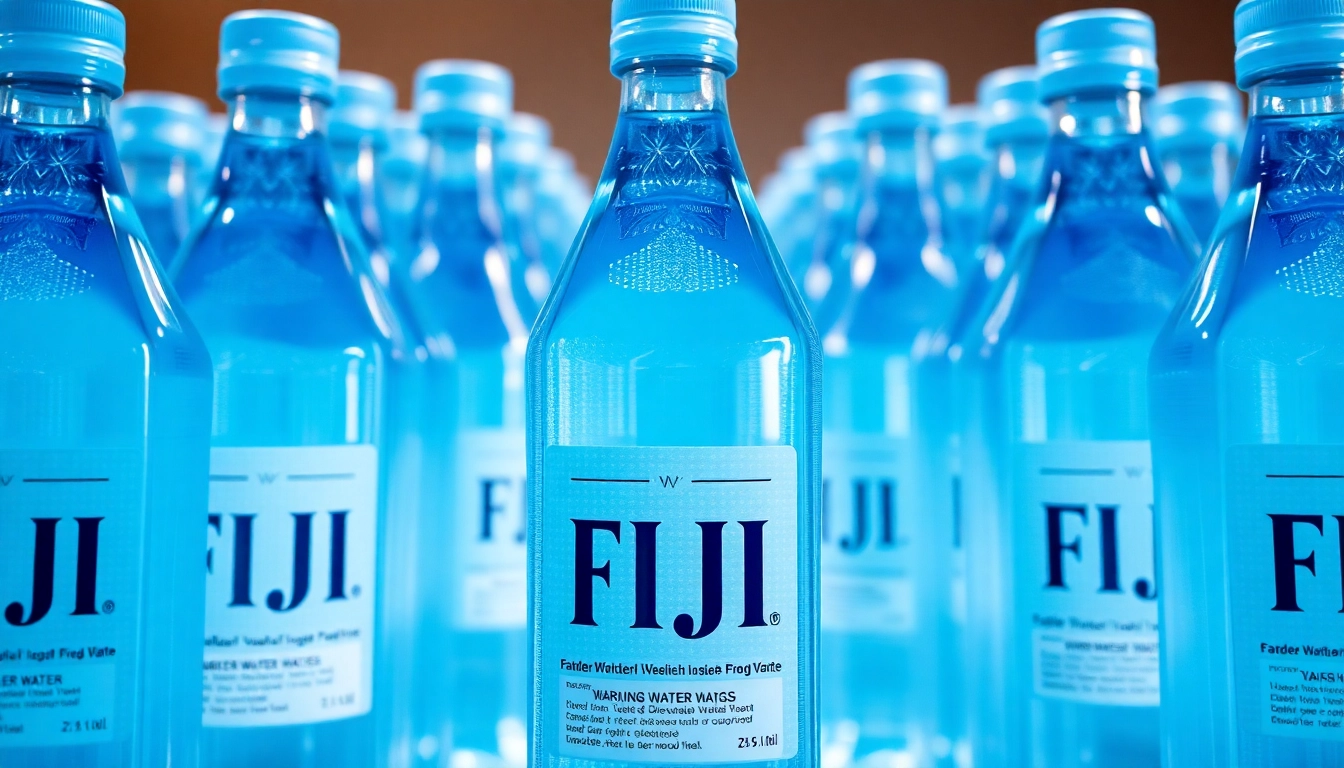Overview of the Fiji Water Bottles Recalled
In a significant development that has captured public attention, the U.S. Food and Drug Administration (FDA) announced a recall affecting nearly 1.9 million bottles of Fiji Natural Artesian Water on May 23, 2024. This recall, designated as a Class III, came after concerns were raised regarding possible contamination with manganese and bacterial presence in the product. The water was primarily sold online via platforms like Amazon.com. This incident has raised questions among consumers, leading to a heightened awareness of product safety in the bottled water industry. For those looking for more detailed insights and updates regarding the fiji water bottles recalled, this article aims to explore various aspects of the situation comprehensively.
Details of the Recall Event
The recall of Fiji Water was officially initiated by Natural Waters of Viti Limited, the company responsible for producing and distributing this popular bottled water brand. The FDA’s investigation pinpointed the recall to approximately 78,533 cases of Fiji Water, which amounts to around 1.9 million individual bottles.
Upon analysis, testing revealed elevated levels of manganese and concerns regarding three bacterial genera that could pose health risks. It is important to note that while manganese is a naturally occurring mineral in water, excessive levels can lead to potential health complications if consumed over time. The specific genus of bacteria raised concerns as they could cause illnesses in consumers, particularly those with weakened immune systems.
As a result of the findings, the FDA led an information dissemination effort, advising consumers to avoid drinking the affected bottles and to look out for specific batch numbers that were identified in the recall notice.
Impacted Product Information
The recall specifically involves 500 mL bottles of Fiji Natural Artesian Water. Each recalled case contains 24 bottles, and these products were available in various distribution channels across the United States, predominantly online.
The batch numbers and relevant details for the recalled products were published by the FDA to assist consumers in identifying which bottles should not be consumed. Additionally, the recall notices included guidance on the proper steps consumers should take upon discovering they have purchased affected products.
FDA’s Role in the Recall
The FDA plays a critical role in ensuring consumer safety regarding food and beverage products in the United States. When contaminants are detected in food or beverage items, the agency is responsible for initiating a recall to protect public health.
In this instance, the recall was considered necessary due to the potential risks associated with consuming contaminated water. The FDA closely collaborates with manufacturers like Natural Waters of Viti Limited to ensure proper procedures are followed to mitigate risks associated with the recall.
Furthermore, the FDA regularly updates the public on recalls and provides information on how to report any adverse health effects stemming from the consumption of contaminated products.
Health Implications of the Contamination
The recall of Fiji Water is not merely a logistical issue; it raises significant health concerns that consumers must understand. The primary risks revolve around the presence of manganese and various bacterial pathogens.
Understanding Manganese and Bacteria Risks
Manganese is an essential trace mineral needed for human health, involved in numerous physiological functions, including bone formation and immune response. However, when consumed in large amounts or over extended periods, it can lead to manganese toxicity, particularly affecting neurological health.
Additionally, the bacterial contamination identified in the recall poses its own set of health risks. Certain bacteria can lead to gastrointestinal illnesses, longer-lasting infections in some individuals, and complications, especially in vulnerable populations. These groups include young children, the elderly, and those with pre-existing health conditions that may impair their immune systems.
Potential Health Consequences
Consumers who may have ingested contaminated Fiji Water could experience a range of health issues, from mild stomach upset to more severe complications, depending on the bacteria involved and individual health conditions. The symptoms of manganese toxicity range from fatigue and muscle stiffness to adverse cognitive effects.
In particular, those who consume high levels of manganese should be on alert for symptoms such as headache, nausea, and neurological symptoms like lethargy or tremors. If consumers experience these symptoms after consuming the recalled water, seeking medical advice promptly is crucial.
Expert Opinions on Safety
Health experts have commented on the situation, emphasizing that while the immediate risk from occasional consumption of contaminated water may be low for healthy individuals, the risk increases for those with compromised immune systems. Testing water from reputable sources and remaining informed about recalls is fundamentally important for public health.
Experts also encourage consumers to be proactive in understanding the sources and safety of the bottled waters they purchase, advising thorough scrutiny of product recalls and safety alerts.
Steps for Consumers Affected by the Recall
Consumers who might be in possession of the recalled Fiji Water bottles should take decisive action to ensure their health and safety. Here are the recommended steps:
How to Identify Recalled Bottles
The FDA has published detailed information on how consumers can identify the specific batches of recalled Fiji Water. It is vital for consumers to check the labels on their bottled water to see if they match the recalled batch numbers.
Typically, the batch numbers are printed either on the label or on the cap of the bottle. Consumers should refer to the official FDA recall notice or websites for accurate batch details.
Returning the Recalled Products
If you identify that you have purchased affected products, it is advisable to return them to the store where they were bought for a full refund. Retailers are expected to comply with recall protocols and should facilitate this return process.
Consumers are encouraged to report the return and their concerns about the recall either to the FDA or directly on the manufacturer’s website for record-keeping and further action.
Reporting Health Issues
If any health issues arise following the consumption of the recalled Fiji Water, consumers should contact healthcare professionals immediately and report these incidents to the FDA. Reporting mechanisms are crucial for tracking and understanding the impact of such recalls on public health.
The FDA provides a dedicated portal for consumers to report adverse health effects, which assists in building accurate data on these incidents.
Alternatives to Fiji Water Post-Recall
As consumers search for alternatives in the wake of the recall, several considerations should guide their choices:
Other Brands with Safe Bottled Water
There are many other bottled water brands known for their safety and quality. When selecting alternatives, consumers should opt for brands that adhere to rigorous safety protocols and have reliable sourcing.
Brands like Evian, Perrier, and Poland Spring are often recommended. Consumers can also consider local spring water brands that have good reputations and transparency regarding their sourcing and testing practices.
Purchasing Guidelines for Safe Water
To further ensure the safety of bottled water, consumers should employ a few key guidelines:
- Check for recalls: Regularly review FDA announcements for any recent product recalls.
- Look for quality certifications: Ensure that the manufacturer complies with safety standards set by relevant health authorities.
- Read labels carefully: Pay attention to the source, mineral content, and any testing mentioned.
- Buy from reputable sources: Avoid purchasing bottled water from irregular outlets where product safety may be compromised.
Environmental Considerations on Bottled Water Choices
When selecting bottled water, it’s also essential to consider the environmental impact of single-use plastics. With the increased awareness around sustainability, many consumers are looking for brands that offer eco-friendly packaging and sustainable sourcing.
Brands that utilize recyclable materials, have water conservation practices, or are involved in environmental restoration projects can significantly align with environmentally conscious consumer values.
Future of Fiji Water After the Recall
The future of Fiji Water post-recall will largely depend on the brand’s response and recovery strategies. Rebuilding consumer trust is paramount for any brand following a public health scare.
Brand Response and Recovery Strategy
Fiji Water has initiated steps to manage the fallout from the recall. These typically include enhancing testing procedures, revising quality control measures, and engaging transparently with consumers. Proactive communication is critical to reassure customers about their commitment to safety.
The brand may also focus on marketing campaigns to reaffirm its quality and safety to restore consumer confidence.
Consumer Trust and Brand Loyalty
Rebuilding trust after such an incident is often a challenging task. Consumers may remain skeptical for a period of time following recalls, particularly if the health impacts are well publicized. Brands must be honest about the issues, provide regular updates, and ensure accountability through validation of their safety practices.
Transparency can be seen as an asset in regaining loyalty. Businesses that choose to engage directly with their consumers and show vulnerability in owning their mistakes are often better positioned to enjoy enduring loyalty.
Steps for Prevention of Future Recalls
Going forward, Fiji Water, like all manufacturers, must implement best practices in quality control to avoid similar incidents. This can include consistent third-party testing, enhanced staff training on safety protocols, and crisis management planning that allows for swift action in case of another issue.
The introduction of robust customer feedback systems can also assist in identifying potential problems before they necessitate a recall. Proactive safety measures will be instrumental in preserving the brand’s reputation in the long run.



